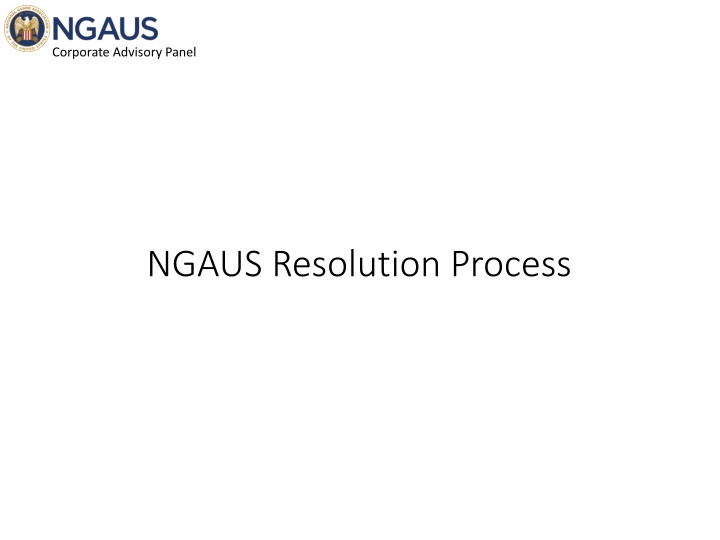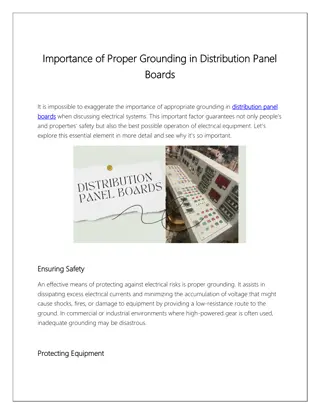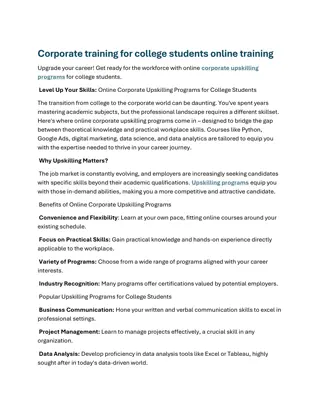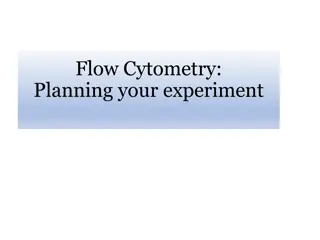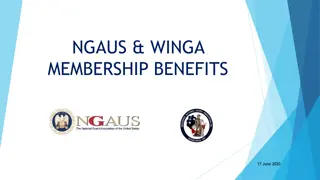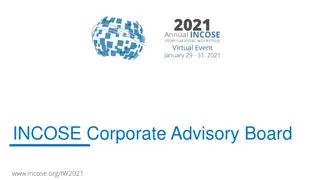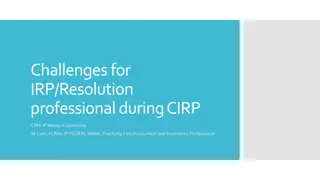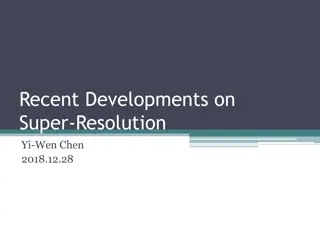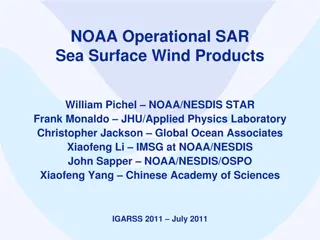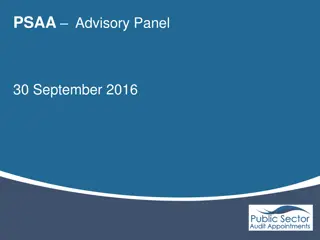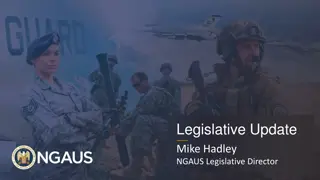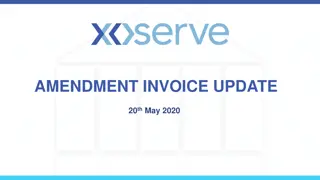Corporate Advisory Panel NGAUS Resolution Process Overview
The Corporate Advisory Panel plays a crucial role in the NGAUS resolution process, aiding in the development and enhancement of National Guard equipment, capabilities, and benefits parity. Resolutions, ranging from standing to emergency, are proposed by state associations and undergo a meticulous cycle of review and approval. Key stakeholders include state associations, Adjutants General, NGAUS Task Forces, members of Congress, and industry partners. The process starts at the state level, with members submitting draft resolutions through their respective associations, which are then reviewed, prioritized, and eventually considered at the NGAUS General Conference & Exhibition. Successful resolutions become legislative priorities for NGAUS advocacy efforts in Washington.
Download Presentation

Please find below an Image/Link to download the presentation.
The content on the website is provided AS IS for your information and personal use only. It may not be sold, licensed, or shared on other websites without obtaining consent from the author.If you encounter any issues during the download, it is possible that the publisher has removed the file from their server.
You are allowed to download the files provided on this website for personal or commercial use, subject to the condition that they are used lawfully. All files are the property of their respective owners.
The content on the website is provided AS IS for your information and personal use only. It may not be sold, licensed, or shared on other websites without obtaining consent from the author.
E N D
Presentation Transcript
Corporate Advisory Panel NGAUS Resolution Process
Corporate Advisory Panel Notable References - First, understand the strategy, priorities, and processes - NGAUS Resolutions website https://www.ngaus.org/legislation/resolutions NGAUS YouTube training video (About 7 minutes long) https://www.youtube.com/watch?v=FX_LiBSTJTo Resolutions SOP and Task Force SOP on the NGAUS website National Guard and Reserve Equipment Report published annually https://prhome.defense.gov/Readiness/Publications/ Air National Guard priorities books https://www.ang.af.mil/Home/ANG-Priorities-Books/ DOD, USAF, and DA strategic documents, i.e. National Defense Strategy, Army Network Modernization Strategy, etc.
Corporate Advisory Panel Resolutions Overview Pg 1 Resolutions are legislative proposals, submitted by states, territories, and the District of Columbia to enhance National Guard equipment, capabilities, and benefits parity Types of Resolutions Standing Already approved by NGAUS membership at the annual conference and help guide NGAUS legislative efforts Draft Changes/deletions to standing resolutions or a new resolution no approved by the NGAUS membership Emergency Resolutions submitted after the deadline of 01 Jul but before 31 Jul prior to the national conference (see SOP for what constitutes an emergency) Key stakeholders in the resolution process include state associations, Adjutants General, NGAUS Task Forces, members of congress, and industry partners
Corporate Advisory Panel Resolutions Overview Pg 2 Resolutions begin at the state association level by NGAUS members Throughout the spring and early summer months, members are encouraged to submit draft resolutions through their state, territory or District association. NGAUS Task Forces serve as advocates, subject matter experts, and advisors to members for their specific area, e.g. Sustainment, DOMOPS, C4I Once a draft resolution passes a state conference, the state association submits it to NGAUS for consideration at the NGAUS General Conference & Exhibition. Once considered and approved at the NGAUS conference, the resolution becomes part of the NGAUS legislative priorities and advocacy in Washington
Corporate Advisory Panel Dec State Draft Jan-May State Approves Oct-Nov Prioritization Leg Action Plan Jun-Jul NGAUS Review Sep NGAUS Resolutions Cycle NGAUS Conf consideration Jul Aug NGAUS BoD review Final/Prep
Corporate Advisory Panel Resolutions in Detail pg 1 Providing Input on Tracking Sheets Tracking sheets serve as an administrative method to compile the views of the various stakeholders in the resolutions process, including NGB, task forces, and NGAUS BoD. In preparation for the annual general conference, task force chairs will review all draft resolutions and provide their input (support/non-support and comments if necessary) to the appropriate NGAUS program manager (Joint, Army, Air) NLT the Wednesday prior to the summer Board of Directors meeting. Resolutions Committee Meeting Task force chairs (or designated alternate; vice chair, etc.) are expected to attend and participate in resolutions committee meetings (Joint, Army, Air) during the general conference to provide task force support/non-support and any additional comments for applicable resolutions. Resolutions Accuracy Task Forces are responsible for identifying outdated information and new information to add to standing resolutions. They must work with the state associations to ensure draft resolutions are submitted through the proper process in order to update standing resolutions. This should begin in January by reviewing standing resolutions and contacting states prior to their state association conference.
Corporate Advisory Panel Resolutions in Detail pg 2 Establishing Top Priorities One of the primary duties of NGAUS task forces is to establish top priorities. After adoption of the resolution packet at the general conference by the membership, each task force will confer to establish top priorities (3-5 in rank order; all resolutions are assigned to a specific task force). This may be accomplished in any manner the task force chooses; meeting, teleconference, e-mail, etc., but should be a collaborative process of the full task force. Fact Sheets Task forces are responsible for providing information for the development of NGAUS fact sheets. NGAUS fact sheets are detailed point papers used by the NGAUS legislative staff to educate and inform members of Congress and their staff on the association s top legislative issues.
Corporate Advisory Panel Examples of Recent Resolutions AH-64D Apache upgrades for all National Guard Attack Systems and modernization of Attack Systems with AH-64E Counter Battery Target Acquisition Radars (Q-53 and LCMR Q-50) High Mobility Multi-Purpose Wheeled Vehicles (HMMWV) M870A4 40-Ton Semi-Trailers Fund and procure Active Electronically Scanned Array (AESA) for ANG F-15 C/D aircraft
Corporate Advisory Panel NGAUS Task Forces NGAUS task forces are special committees appointed by the NGAUS Chairman of the Board, with concurrence of the Board of Directors (reference NGAUS by-laws Section 6.02). Task forces work closely with the NGAUS legislative staff to provide input on resolutions and fact sheets, advise the general conference committee on resolutions, and address special issues assigned by the Chairman of the Board.
NGAUS Task Forces Corporate Advisory Panel Task forces are grouped into three general areas; Joint, Army or Air and then broken down by issue categories or weapon system grouping. Joint Task Forces Personnel and Benefits Medical Homeland Security Army Task Forces Fire Support Combat Vehicle/Ground Combat Task Force Army Sustainment Army Aviation C4I Engineer Air Task Forces Combat Air Forces Mobility Air Forces Combat-Mission Support
Corporate Advisory Panel Task Force Membership Task Force Members Task force members must be currently serving National Guard members and current members of NGAUS. They should have in-depth knowledge of the subject matter to be considered by the task force. It is recommended that each task force have a minimum of seven members to avoid tie votes, and to ensure that all six NGAUS areas are represented. All votes of the task force will be conducted in executive session by members of the task force. Task force membership includes the following: Chair Each task force will have a chair appointed to preside over all meetings of the task force. The NGAUS Chairman of the Board will appoint task force chairs and vice chairs. Vice Chair The vice chair will assume the responsibilities of the chair in his or her absence Professional Staffers Non-members The role of professional staffers is to provide expert assistance and coordination to the task force.
Meetings Corporate Advisory Panel Meetings Meetings of the task force are at the call of the task force chair. At least two-thirds of the voting body of the task force must be present to satisfy quorum requirements. Teleconference meetings are encouraged. It is recommended that task forces meet as necessary. However, a minimum of two meetings per year are requested in order to facilitate NGAUS business in a timely and effective manner: Resolutions Review Meeting: This meeting shall take place prior to NGAUS Board of Directors Summer Meeting. The purpose of this meeting is to review and comment on NGAUS draft resolutions to be considered at the upcoming general conference. NGAUS General Conference: The task force chair, or vice chair when chair is unavailable, will attend the NGAUS General Conference. They will participate in the resolutions meetings and hold a task force meeting at the designated time per the master agenda. Industry presentations are encouraged at this meeting. Task Force Chairs are also encouraged to walk the exhibit floor to meet industry members who have an interest in their task force. Prioritization Meeting: Following the NGAUS general conference, task forces meet to prioritize the adopted resolutions. This must be accomplished by the deadline for the legislative objectives book. In addition to prioritizing resolutions, the task forces must also assist in formulating fact sheets and drafting new resolutions for the following year s resolution process.
Corporate Advisory Panel Task Force Chair Duties Presiding over all meetings of the task force Ensuring meeting minutes are recorded and provided to the NGAUS legislative staff, who will then forward a copy to the Chairman of the Board, vice Army &Air, and an information copy to the NGAUS president. Providing comment (support/non-support) at the NGAUS general conference resolutions committee meeting Recruiting members and professional staff to serve on the task force Delivering an annual report to the NGAUS Board of Directors, as required by the Chairman of the Board (Legislative Staff will provide example report) Ensuring that the applicable NGAUS Program Manager is provided with a roster of task force members
POCs Keith Klemmer, BG (Ret) NGAUS Corporate Advisory Council Keith.Klemmer@me.com 571-294-9087 Mike Hadley, COL (Ret) NGAUS Legislative Director Mike.Hadley@ngaus.org Mark Malizia NGAUS Legislative Analyst Mark.Malizia@ngaus.org
